August 29, 2024
Earlier this month, I had the privilege of attending the Orthotics Prosthetics Canada (OPC) National Conference held in Fredericton, New Brunswick. The event, themed "Shaping the Future," was an inspiring gathering of professionals from across the country, all dedicated to advancing the field of prosthetics and orthotics. The conference offered a robust agenda filled with insightful presentations, cutting-edge research, and opportunities for meaningful networking.
The conference kicked off with an enlightening keynote by Chris Cedarstrand, a motivational speaker and Team Canada alumni. Chris shared his journey post-amputation, emphasizing the importance of finding a personal "why" to regain a fulfilling lifestyle. His talk set a powerful tone for the days ahead, inspiring practitioners to think deeply about patient motivation and care.
Following the keynote, we were given a tour of the University of New Brunswick’s Centre for Adaptive Rehabilitation Engineering (CARE). The facility, equipped with state-of-the-art labs, showcased innovative approaches to mobility rehabilitation, including the use of exoskeletons, virtual reality, and advanced motion-capture technology. It was fascinating to see how these technologies are being integrated into both clinical and research settings to improve patient outcomes.
The second day featured a series of presentations focused on clinical innovations and the latest research in prosthetics and orthotics. Angela Creighton-Leroux from Kelowna General Hospital presented on the treatment of deformational plagiocephaly using cranial remolding orthosis (CRO). Her session highlighted the critical role of CRO in pediatric care and the importance of early intervention.
Andreas Kannenberg, Executive Medical Director at Otto Bock HealthCare LP, delivered a compelling presentation on the real-world impact of microprocessor-controlled prosthetic knees (MPKs). His talk underscored the significant reductions in falls and fall-related injuries associated with MPKs, supported by large-scale epidemiological studies. This research is particularly valuable for clinicians and healthcare payers involved in prosthetic care.
On the third day, the focus shifted to emerging technologies with presentations like "LIMBKIT: A Portable 3D Printing Kit for Prosthetic Sockets" by Mona Alkhudair and her team. This session explored how 3D printing is revolutionizing prosthetic care, particularly in remote areas where access to traditional prosthetic services is limited. The results of their study showed promising outcomes, suggesting that 3D-printed sockets could be a viable alternative to conventional methods.
Brittany Pousett from Barber Prosthetics Clinic Inc. in Vancouver shared insights from her research on how prosthetists can support individuals with lower limb absence during pregnancy. Her findings revealed significant variations in patient experiences and highlighted the need for tailored prosthetic management during the perinatal period.
The final day included practical workshops and discussions on topics such as the fabrication of custom liners for irregular limb shapes, led by John Paul Hanas from Hamilton Health Sciences Corporation. His step-by-step demonstration was particularly useful for technicians looking to improve their fabrication techniques.
One of the standout sessions was presented by Amanda Mayo from Sunnybrook Centre for Independent Living. She discussed the challenges and successes of implementing digital fabrication methods for prosthetic sockets in Ukraine, a project aimed at increasing prosthetic care capacity in conflict zones. The impact of this work on both patients and local prosthetic teams was profound, illustrating the power of technology in addressing global health challenges.
The conference concluded with a session on trauma-informed care, emphasizing the importance of considering the emotional and psychological aspects of patient care. The integration of trauma-informed approaches into prosthetic and orthotic practice was presented as a critical step toward holistic, patient-centered care.
Attending the OPC National Conference in Fredericton was an enriching experience. The event brought together some of the brightest minds in the field, all committed to pushing the boundaries of what’s possible in prosthetics and orthotics. The knowledge and connections gained from this conference will undoubtedly shape the future of our practice and the care we provide to our patients.
As we continue to advance in this ever-evolving field, it’s clear that the future of prosthetics and orthotics is bright, with new technologies and approaches offering unprecedented opportunities to improve patient outcomes.
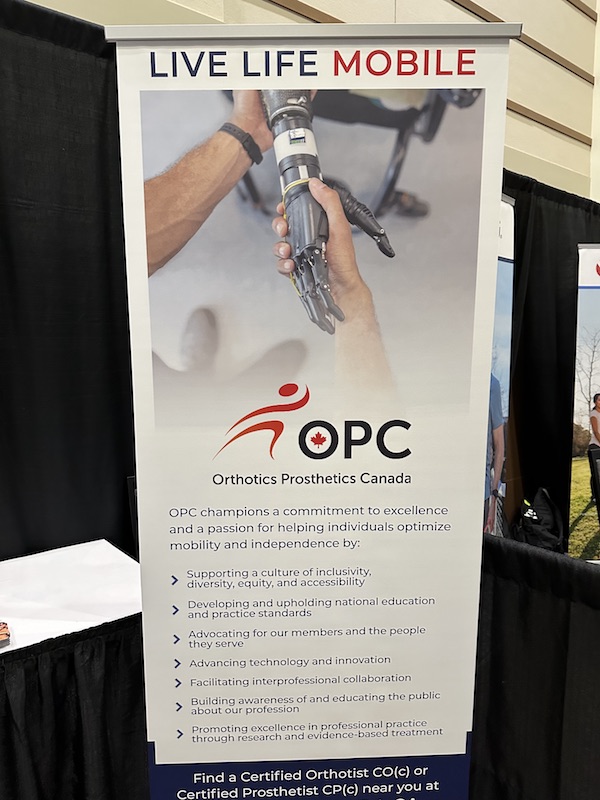
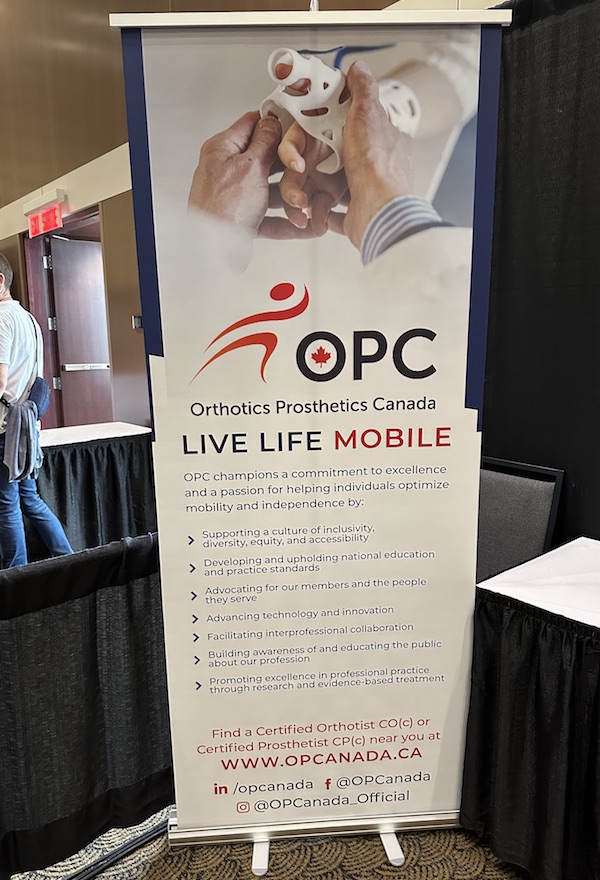
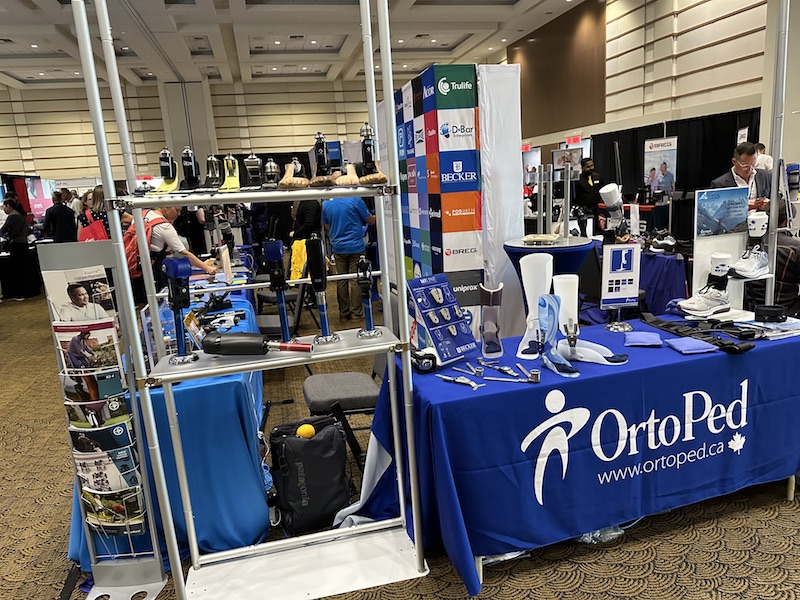
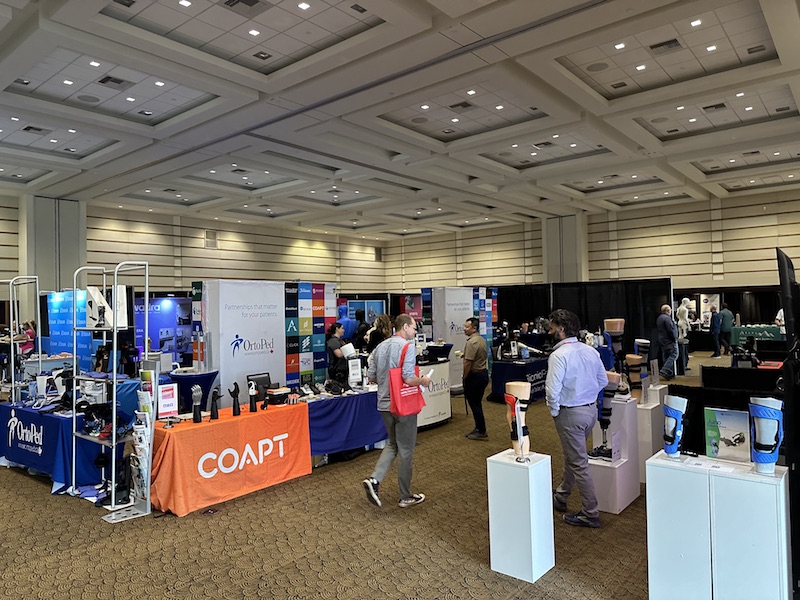
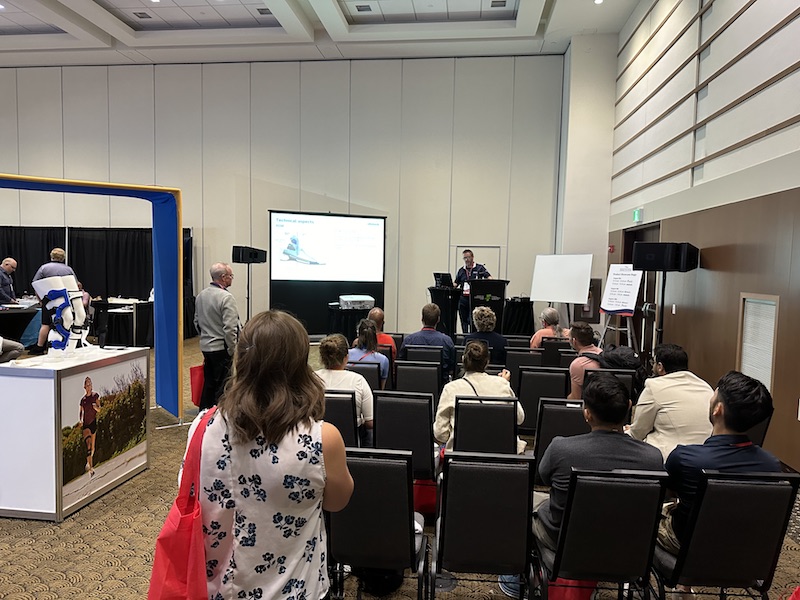
Beyond the main sessions, the OPC National Conference featured a variety of additional presentations that highlighted the breadth and depth of current research and clinical practices in prosthetics and orthotics. Below is a summary of these insightful contributions:
Deformational Plagiocephaly & Cranial Remolding Orthosis Treatment
Speaker: Angela Creighton-Leroux, Certified Prosthetist and Orthotist, Kelowna General Hospital
Summary: This session provided an overview of deformational plagiocephaly with a focus on cranial remolding orthosis (CRO) treatment, discussing its importance in early pediatric care.
Real-World Impact of Microprocessor-Controlled Prosthetic Knees
Speaker: Andreas Kannenberg, Executive Medical Director, Otto Bock HealthCare LP
Summary: Kannenberg presented research on the benefits of microprocessor-controlled knees, demonstrating significant reductions in falls and related injuries among users.
LIMBKIT: A Portable 3D Printing Kit for Prosthetic Sockets
Speakers: Mona Alkhudair, Jeff Erenstone, Deanna Hines, Tanya Gripper, Melana Rapaport, Scott Hedlund, Ethan Simpson, William C. Miller
Summary: The LIMBKIT project explored the feasibility of using portable 3D printing kits to create prosthetic sockets, especially in remote and underserved areas.
How Can Prosthetists Help Individuals with Lower Limb Absence Navigate Their Pregnancy Journey?
Speaker: Brittany Pousett, Director of Clinical Research, Barber Prosthetics Clinic Inc.
Summary: Pousett discussed the challenges and solutions for prosthetic management during pregnancy, based on interviews and chart reviews of women with lower limb absence.
Transradial Prosthesis Assessment System
Speakers: Calvin C. Ngan, Harry Sivasambu, Vishal Pendse, Elaine Ouellette, Katrina Meng, Jan Andrysek
Summary: This session introduced a new assessment system for transradial prostheses, focusing on socket fit and prosthetic control during clinical evaluations.
Manufacturers Workshop - OrtoPed
Speaker: Simon Beals, Clinical Sales - Orthotics/LEC, OrtoPed ULC
Summary: Beals reviewed the biomechanical elements associated with drop foot and introduced a novel carbon fiber ankle-foot orthosis system that addresses multiplanar gait deficits.
Manufacturers Workshop - Ottobock
Speaker: Michael Pearce, Manager of Professional Clinical Services, Ottobock Healthcare Canada Ltd.
Summary: Pearce presented the latest advancements in microprocessor-controlled knees, including the X4, which offers enhanced functionality for a broader patient group.
Development and Preliminary Testing of a Hip-Knee-Ankle-Foot Prosthesis with a Powered Hip Joint
Speaker: Farshad Golshan, University of Ottawa
Summary: Golshan presented on the development of a novel powered hip joint prosthesis, detailing the testing process and participant experiences.
Understanding the Prevalence of Chronic Pain in the Prosthetic and Orthotic Patient Population
Speakers: Amber Major, Hodgson Orthopedic Group; Kyle Stunden, Doctor of Chiropractic, Coast Therapy
Summary: This session explored chronic pain among prosthetic and orthotic patients, synthesizing current evidence to inform tailored interventions.
Bracing Strategies for Hypermobile Ehlers-Danlos Syndrome (hEDS): Can You Overbrace?
Speakers: Vanessa Lavoie, Certified Orthotist, Metro Health Services; Kendra Hebert, Medical Student, Dalhousie Medicine New Brunswick
Summary: The presentation discussed the challenges of treating hEDS, a connective tissue disorder, and offered strategies for improving patient care.
Transfemoral Bone-Anchored Prostheses: Evidence-Based Prescription of State-of-the-Art Knees
Speaker: Laurent Frossard, Chief Scientist Officer, YourResearchProject / Griffith University / Queensland University of Technology / University of the Sunshine Coast
Summary: Frossard highlighted the benefits of state-of-the-art microprocessor-controlled knees for individuals with bone-anchored prostheses, focusing on improving patient safety and mobility.
Being Informed: Integrating Trauma-Informed Care into Prosthetic and Orthotic Practice
Speaker: Holly Tetzlaff, Clinical Student, George Brown College
Summary: This session emphasized the importance of trauma-informed care in the prosthetic and orthotic field, discussing how to create supportive environments for patients.
Diabetic Foot Ulcer Offloading Workshop
Speakers: John Rahman, Certified Orthotist, Rahman Orthotics; Linda Laakso, Certified Orthotist, Custom Orthotic Design Group Ltd.
Summary: The workshop provided strategies for preventing and managing diabetic foot ulcers, with a focus on orthotic treatments to offload pressure from vulnerable areas.
Improving Prosthetic Care in Ukraine with Digital Fabrication and 3D Printing of Prosthetic Sockets
Speaker: Amanda Mayo, Physiatrist, Sunnybrook Centre for Independent Living
Summary: Mayo discussed the implementation of digital fabrication methods in Ukraine to improve prosthetic care, particularly in conflict zones.
Additive Manufacturing in the P&O Workspace: Flexible Custom AM Prosthetic Covers Design Workshop
Speaker: David Smith, Owner, Beacon Ortho Ltd.
Summary: Smith shared the successes and challenges of developing 3D-printed prosthetic covers, highlighting the benefits of additive manufacturing in creating durable and cosmetically superior solutions.
Exploring Training Strategies for Enhanced Myoelectric Control in Prosthetic Hands
Speaker: Elaheh Mohammadreza, Memorial University of Newfoundland
Summary: This study explored the impact of various training protocols on myoelectric pattern recognition control for upper-limb prostheses, aiming to improve accuracy and robustness.
Practical Health and Safety Education for Prosthetic and Orthotic Students at George Brown College
Speakers: Adrienne Cuch, Alora Stockermans, Amy Richardson, Gordon Ruder
Summary: The team from George Brown College discussed their approach to health and safety education for students in the prosthetic and orthotic fields, focusing on preparing them for real-world scenarios.
Leatherwork Tips for Fabricating Gauntlets
Speaker: Melinda Le, Boundless Biomechanical Bracing
Summary: Le provided practical tips for fabricating leather gauntlets, including draping techniques and lining the tongue.
Shaping the Future of Orthotic and Prosthetic Education in Canada
Speakers: Amy Richardson, Emily Northcote, Linda Laakso
Summary: The National Education Standards Committee provided updates on the ongoing efforts to improve and update the OPC accredited education pathway.
A Qualitative Study Assessing Sex Differences in the Perspectives and Priorities of People with Lower Limb Amputations
Speaker: Tess Carswell, University of Victoria
Summary: Carswell’s study explored sex-specific experiences of individuals with lower limb amputations, aiming to inform sex-specific rehabilitation and prosthetic design.
Elevate Your Practice: Embracing Person-Centered Care
Speaker: Lori Ballard, Certified Orthotist and ROKband Design Specialist, Central Okanagan Division of Family Practice
Summary: Ballard discussed the shift from traditional clinical approaches to person-centered care in prosthetics and orthotics, emphasizing the importance of understanding what matters most to patients.